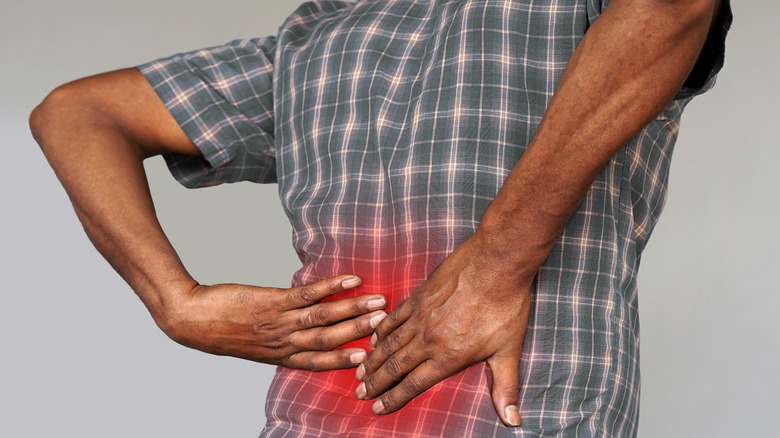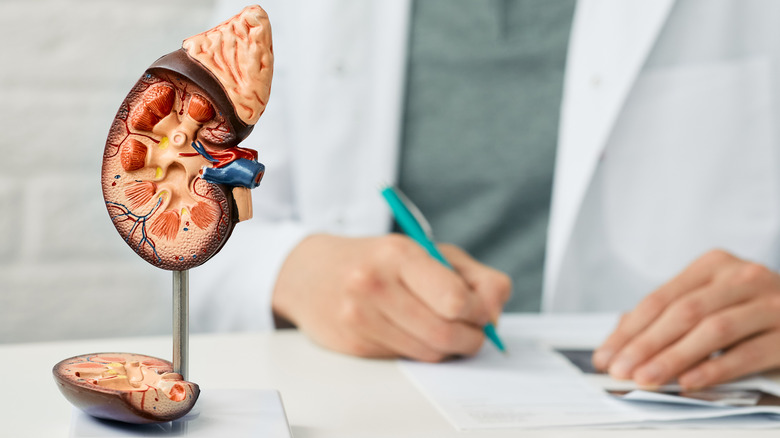What Really Causes Kidney Stones?
The kidneys are the body's garbage truck. They get rid of extra waste and fluids to help maintain a healthy balance of water salts and other minerals in the blood. However, many problems, like kidney stones, can cause discomfort in the process. The National Institute of Diabetes and Digestive and Kidney Diseases (NIDDK) notes that about 6% of women and 11% of men in the United States develop kidney stones at least once in their lifetime.
Kidney stones (also known as nephrolithiasis) are hard deposits composed of minerals, such as calcium, oxalate, and uric acid. The stones vary in size and type, which is where the problem lies. The smaller stones can exit your body through your urine. However, the bigger the stone, the riskier the situation (via WebMD).
Numerous risk factors are linked to kidney stones, including sex, age, and heredity. Dehydration is another risk factor for kidney stones, per MedicalNewsToday. The stones can form when your urine doesn't have enough fluid to dilute the crystal-forming substances.
Types of kidney stones
The differences in kidney stones and classification are based on their material components (via MedlinePlus). Based on this premise, there are four main types of kidney stones: calcium-based, struvite, cystine, and uric.
Calcium-based kidney stones form when calcium mixes with the oxalate component in urine, per Johns Hopkins Medicine. Many people know calcium strengthens the bones and teeth, but it also helps blood vessels distribute blood throughout the body. Furthermore, it helps release hormones that manage various bodily functions (via National Institutes of Health). However, high calcium levels in the body can cause kidney stones (MedlinePlus)
Struvite stones are caused by the bacteria proteus and klebsiella, which converts urea to ammonia and raises the pH level of urine (via WebMD). This type of kidney stone accounts for 10% to 15% of all cases. It also affects women more than men, since they have shorter urethras. This makes it easier for bacteria to enter, per WebMD.
Cystine stones are another common type. The causative agent of cystine stones is called cystinuria, a disorder that causes cystine to leak in your urine, per the National Kidney Foundation. Too much cystine in your urine can cause kidney stones to form.
Lastly, uric stones are caused by a high purine concentration in your body. This type of kidney stone may be hereditary (via Mayo Clinic).
Treatment options for kidney stones
Various types of kidney stone treatment are available. Your doctor can advise you of the appropriate treatment based on the type and size of your kidney stone.
The most common treatments for kidney stones include lithotripsy, ureteroscopy, and surgery (via WebMD). Lithotripsy — also known as shock wave lithotripsy — is a type of shock wave therapy that breaks up the stones using sound waves, resulting in the debris passing out with the urine. The treatment is also known as extracorporeal shock wave lithotripsy. A sonic probe is placed on the skin, which sends sound waves through the tissue to the stones, per Johns Hopkins Medicine.
Ureteroscopy involves the doctor passing a scope through the bladder before using a small basket to collect the stones. Surgery is the most invasive method of treating kidney stones. It's commonly used in cases where the stones are too large, and the other available treatment options are not viable, per WebMD.
Home remedies include drinking lemon juice or consuming apple cider vinegar, per MedicalNewsToday. However, talking to your doctor before trying any of these self-treatment options is crucial.



